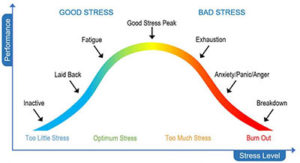By Timi Gustafson, R.D.

Being regularly overworked and stressed out likely leads to health problems long-term, but feeling bored or having too much time on your hands can also have negative effects, a government-sponsored study from Germany on health and safety issues in the workplace concluded.
Unlike here in the United States, labor laws in many European countries, including Germany, impose strict limits on how much time people can spend at work. 35-, 32- or even 30-hours workweeks are not uncommon, and month-long annual vacations are mandatory in some states. Yet it is not altogether clear whether a lighter workload and more free time automatically lead to greater quality of life.
Boredom and monotony produce their own kind of stress, which can be just as harmful as exhaustion from work overload. A study by the National Institute of Health (NIH) found that uninspiring occupations can elicit considerable stress, especially when coupled with a need for high alertness, e.g. in security and surveillance jobs.
Like unemployment, underemployment or part-time work can cause stress, and not just because of financial concerns. Not having enough structure in one’s life, or feeling left out in terms of work-related opportunities can lead to loss of self-esteem, anxiety, and depression, according to a report by the American Psychological Association (APA).
So, is there such a thing as a healthy middle when it comes to stress at work?
Most people who work between 35 and 40 hours a week don’t experience significant health damages related to stress, said Dr. Monika A. Rieger, a professor of medicine at the University of Tübingen, Germany, and an expert in work-related health matters who was not involved in her country’s government study, to the German news magazine “Der Spiegel.” However, consistently laboring beyond 40 hours can potentially lead to health problems. It seems that those who work harder are also more vulnerable to disease, she added.
Still, experts agree that there is such a thing as “good stress.” Especially when work involves variety and creativity, it can be a rewarding experience. The more control people can exercise over their activities, and the more they benefit from the results, the more likely they will enjoy what they are doing, even if it entails a lot of personal effort.
There is indeed a kind of stress that is good for you, one that makes you excited and let’s you push harder. But even stress that is motivating and enhances performance can cause harm if it’s not kept in check, according to Elizabeth A. Scott, a wellness coach specializing in stress management who wrote extensively about the subject.
For instance, workaholics may pride themselves in getting lots of work done, but that doesn’t mean their behavior is healthy. Good stress can turn into bad stress, especially when it develops into chronic stress that offers no reprieve. That’s the kind of stress we really have to worry about, says Scott.
So while there is no precise measure by which we can determine when work-related stress becomes damaging, it is clear that there is a limit of what is tolerable. To keep workers from reaching that, it is important for companies to add as much quality to their workplaces as possible – for example by allowing their staff to take frequent breaks, do a variety of different tasks, partake in wellness programs, etc. After all, a work environment where people thrive instead of suffer is in everyone’s best interest.
———————————————————————————–
 Timi Gustafson, RD, LDN, FAND is a Registered Dietitian, health counselor, book author, syndicated newspaper columnist and blogger. Timi completed her Clinical Dietetic Internship at the University of California Medical Center, San Francisco. She is a Fellow of the Academy of Nutrition and Dietetics, an active member of the Washington State Dietetic Association, and a member of the Healthy Aging, and Wellness Nutrition practice groups. USA.
Timi Gustafson, RD, LDN, FAND is a Registered Dietitian, health counselor, book author, syndicated newspaper columnist and blogger. Timi completed her Clinical Dietetic Internship at the University of California Medical Center, San Francisco. She is a Fellow of the Academy of Nutrition and Dietetics, an active member of the Washington State Dietetic Association, and a member of the Healthy Aging, and Wellness Nutrition practice groups. USA.
Reprinted with the author’s permission.




